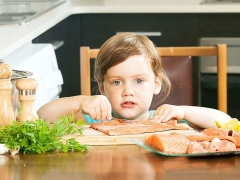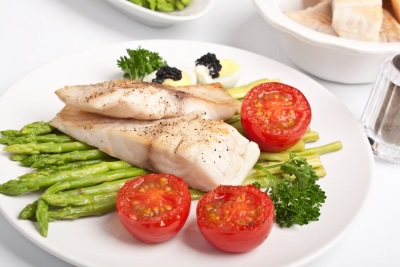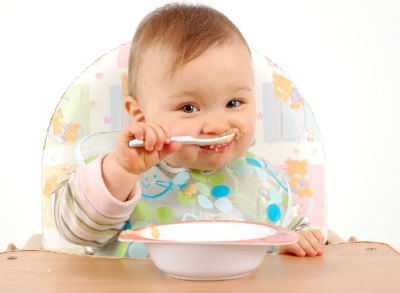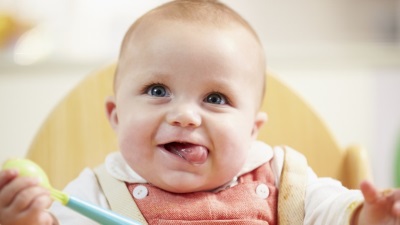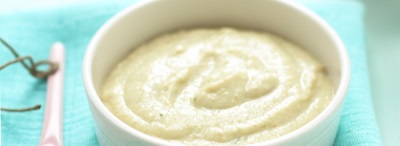From which fish and from what age can you start feeding the child?
The fish is undoubtedly useful and deserves a special place in the baby’s menu, but it is necessary to introduce it into the children's diet. When is the first time to cook toddler fish and how to do it?
pros
Fish is a useful product because it contains many substances that are necessary for the growth and health of the baby. These are high-grade proteins that are easily digested, and unique fats, which are scarce in other products, and a large list of trace elements. In addition, the fish is different from the meat more delicate structure, so it is easier to digest:
- Squirrels with which the fish is rich are easily digested. They contain all the amino acids necessary for a child’s body, including methionine, tryptophan, taurine, and lysine.
- Fish is a wonderful source of fat-soluble vitamins, in particular, A, D and E, as well as healthy Omega fats.
- Fish lacks coarse connective tissue fibers and refractory fats, so the enzymes of the children's digestive tract easily process this product.
- Sea fish has a rich mineral composition, for example, it has a lot of iodine and fluorine.
Which fish is healthier - sea or river?
In the diet of the child, you can enter as fish caught in the sea, and species that live in rivers. At the same time advised to begin with varieties of marine fish. What is the difference, similarity and benefits for the human river and sea fish, see the table:
River fish | Sea fish | |
Fat | Contains a small amount of omega fats | Contains a lot of Omega-3 and Omega-6 fats |
Minerals | Large amounts of calcium and phosphorus | A large amount of magnesium, manganese, calcium, iodine, phosphorus, fluorine, zinc, chromium, iron and other elements |
Learning | Quick and very easy | Quick and easy |
Allergy risk | Low | Tall |
Cost of | Cheaper than sea | Presented by a wide range of prices. |
Freshness | Sold live or fresh chilled | Is on sale cooled, but more often frozen |
Danger | Often contaminated by harmful substances that enter the fish from the reservoir, and is also often a source of worms. | Less polluted, therefore safer than river water. |
Cooking features | Quite problematic to clean, and some varieties are not recommended for baby food due to the abundance of small bones | It is easier to clean, because the bones are large and presented in smaller quantities. |
Harm
The main disadvantage of fish is its high allergenic ability. That is why the crumbs with an allergy to any products introduce fish later, very carefully and only during a period when allergic processes are not aggravated.
Consider the following features:
- If the fish swim in polluted water, it absorbs harmful compounds from the reservoir, for example, metal salts.
- Untreated fish is dangerous at increased risk of infection by worms and pathogenic bacteria.
- Fish dishes deteriorate quickly, so children are given food, a component of which is fish, only freshly prepared.
- Herring can be given to a child from the age of two.
- Such fatty fish as salmon, eel, catfish or halibut should not be given to children under three years old.
- Frying fish for a child, as well as offering smoked fish to your child is not recommended for up to 3 years.
Is there an allergy often?
Fish is considered one of the highly allergenic products, so the dishes from it are given in minimal quantities, checking the reaction of the child’s body, after which they gradually increase the single portion. Scarce can react to the introduction into the diet of fish nausea, rash all over the body, pain in the abdomen, diarrhea, pruritus, swelling of the lips. If the baby has such signs, fish feed is canceled and turned to the pediatrician.
Try again enter the fish in the children's menu, you can at 2-3 years of age. If the peanut again responds to the fish dish with negative symptoms, you should exclude the fish from its diet, and so that the body does not suffer from lack of nutrients, begin to give a crumb of vitamin D and omega fats as a dietary supplement.
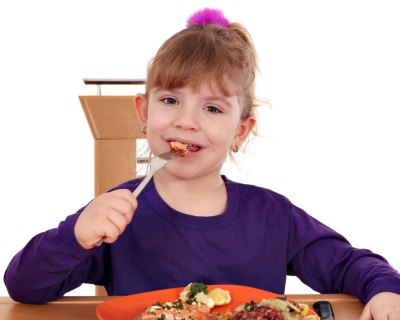
From what age is it better to give?
Fish lure is recommended for healthy babies with 10 or 11 months. The first fish that the child tries should be representative of one of the low-fat varieties. With a tendency to allergies familiarity with fish dishes should be postponed for at least a year.
Oily fish, such as mackerel or pink salmon, are recommended for children over the age of three.
Enter into the diet
In the diet of babies, fish appears after getting used to the complementary meat, while up to the year meat dishes are not given on the same day as fish. To acquaint the child with the fish should be with 1/2 teaspoon of this product. Then the amount of fish in the day menu is adjusted to a portion from 50 to 70 grams, while offering a toddler to fish twice a week.
Which fish is best suited for the first feeding?
The first fish that a baby can try should always be fresh, non-greasy and low-allergenic. Compliance with such characteristics is noted in cod, hake and salmon. You can also give your child pollock, blue whiting, navaga, sea bass and haddock.
In what form can I give for the first time?
Babies younger than a year begin to give fish mashed potatoes, and later offer small pieces of boiled fish, as well as various fish dishes. First, give the toddler to try the fish without spices and other additives. Further, dill, carrot, parsley and other seasonings will help to improve and diversify the taste of fish dishes for a child.
For fish dishes in the menu of small children it is worth buying fillets so that the little ones do not get bones.
How to cook?
The best option for cooking fish for baby food is steaming. You can also boil the fish in a small amount of water. It’s enough to cook small pieces of fish for fifteen minutes, and the whole pieces or fish will have to be cooked for half an hour or longer.
Fish puree
To make fish puree, take 120 grams of fish fillet and two teaspoons of milk and vegetable oil. Boil the fish for about twenty minutes, cool it and chop it in a blender or meat grinder. After adding the butter and milk, put the fish on a small fire and bring to a boil. Such mashed potatoes in the form of the finished product can be stored in the refrigerator for 48 hours in a tightly closed container.
Fish meatballs
Grind in a meat grinder 120 grams of fillet of lean fish, as well as 20 grams of pre-soaked of bread. After adding half the egg yolk to the resulting mass, two teaspoons of vegetable oil and a pinch of salt, after thoroughly mixing, make small meatballs. Put them in a saucepan and cover with water so that the meatballs are half full. Stew such meatballs on low heat for about twenty minutes.
Fish pudding
You will need a half of boiled potatoes, which you need to knead by adding milk (2 tablespoons), as well as vegetable oil (about 2 teaspoons). Separately, in a little salted water you need to cook fish fillets (about 100 grams). Combining chopped fish and potatoes, add half of the beaten chicken egg and, after mixing, put the mixture into the form. Cooking such pudding is necessary in a water bath or in a double boiler for about 30 minutes.
Fish puree in jars
Jars with ready fish puree are distinguished by such advantages:
- The product is ready, which saves mother's time and effort.
- The fish in such jars is tested and guaranteed to be safe for the crumbs.
- Many fish purees are represented by combinations of fish with cereals or vegetables, so you get a nutritious full meal in each jar.
The disadvantages include perhaps the high cost of such power. In addition, the range of such mashed potatoes, as a rule, is not very extensive.
Can I give canned fish?
Special children's canned food is allowed to give from the age indicated on the package. Those canned fish that adults eat should not be given to children under 4 years old.
See the Babadu Academy Video for the recipe for cooking fish dumplings.
Tips for feeding
- The first portion of fish sauce should be a maximum of half a teaspoon.
- It is best to treat your baby with a new product for breakfast, then you will be able to evaluate during the day how the baby responded to fish food.
- Fish dishes are usually given twice a week, replacing meat products with them in the third feeding (lunch). Also, the fish because of its easy assimilation is permissible to give the baby for dinner.
- For young children, it is preferable to steam or boil fish. You can also bake it in the oven or cook in a slow cooker.
- If you bought frozen fish for a child, you should not defrost it completely. Give the fillet to slightly melt, then dip into boiling water and cook for about 10-15 minutes on minimal heat.
- If you are going to cook the river fish for the kid, the first broth should be drained. As soon as the fish boils, water is drained, the product is poured with clean water and then boiled until ready.
- It is not recommended to mix in the same dish for the child several different types of fish.
- Give crumbs always just a freshly prepared fish dish.
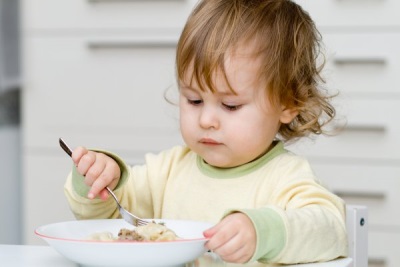
The norms of use for infants and older children
Child's age | Recommendations for eating fish per day |
10 months | 5-40 g |
11-12 months | 40-50 g |
2-3 years | 50 g |
4-6 years | 50 g |
7-13 years old | 50-60 g |
14-17 years old | 60-70 g |
What if the child does not want to eat?
For the first acquaintance with fish, select the product that the child likes (for example, zucchini) and connect the fish sauce with it. To remove the pronounced fishy smell, you can sprinkle the fish fillet with lemon juice before cooking, as well as cook the fish with greens (dill, parsley).
Tell your child about the usefulness of the fish, as well as stories related to the sea, for example, about pirates or mermaids. Never force a child to eat fish dishes if the pussy strongly protests. Exclude fish for a while from the menu, and later try to offer in a different form. Perhaps the crumbs do not like fish puree, but he will not give up the steam patty.
Fresh Fish Tips
- It is best to buy fish for children's menu in stores where there are documents confirming the quality of the product.
- Look carefully at the fish, looking at the gills (they should be red) and eyes (in fresh fish, they are clear and clear, and in spoiled fish they are dull and dried).
- Pay attention to the fins of the fish - they should not be damaged.
- Fresh sea fish will always be with clean shiny scales without mucus.
- Smell the product - the fish should not have any unpleasant or sharp smell.
- Push down the fish carcass slightly. If there is a hole, this product is not completely fresh. In a quality fish that has recently been caught, the meat will be elastic and dense.
